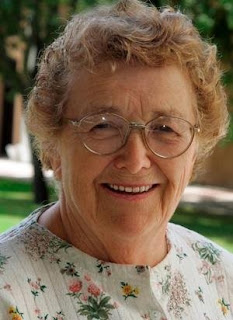Not many Christian theologians have been named Rosemary. In fact, not many Christian theologians before this century were women. But Rosemary Radford Ruether was a noted theologian and a leader of feminist liberation theology. She was born on November 2, 1936, and died in May of this year.
 |
| Claremont School of Theology photo |
Rosemary
Radford was born in Minnesota, the daughter of an Episcopalian father and a Roman Catholic
mother. When she was 12, her father died and she moved with her mother to
California where she attended Catholic schools.
Rosemary graduated from prestigious Scripps College, a
private women’s school in southern California, and then earned M.A. and Ph.D.
degrees at Claremont School of Theology, a United Methodist institution.
While still a student at Scripps, she married Herman Ruether
in 1957, and eight years later they had three children—and she had her Ph.D. and
was authoring a book. During her lifetime, she wrote 36 books and more than 600
scholarly articles and also gave a formidable number of public lectures.
Ruether’s teaching career was spent entirely in Protestant
schools: Howard University, Pacific School of Religion, and Garrett-Evangelical
Theological Seminary where she taught the longest. But she was a
self-identified Catholic for her whole life.
Rosemary Radford Ruether is best known as a pioneer feminist theologian
and an advocate of ecofeminist theology. Her major books are Sexism
and God-Talk: Toward a Feminist Theology (1983) and Gaia and God:
An Ecofeminist Theology of Earth Healing (1992).
The subtitle of the second chapter of Ruether’s 1983 book is
“Male and Female Images of the Divine,” and she concludes with a subsection
titled “Toward a Feminist Understanding of God/ess.”
There is strong opposition to any reference to a Goddess in Christianity,
since that term is always feminine, but little opposition to the use of
Christianity’s use of God, which has overwhelmingly been seen as male,
at least until recently. Ruether’s term helped correct that theological error.*
To overcome the powerful and long tradition of envisioning
God as male, Ruether uses the Goddess image to emphasize that God is equally
female, which is the same as saying that God transcends gender bifurcation.
With regard to her ecofeminism, Ruether was the first to
connect publicly the domination of the earth with the oppression of women. In
her 1992 book, she sought to “demonstrate the interconnectedness of domination
and deceit, the social systems of power over women . . .” (p. 8).
Ruether is also known as a critic of such traditional Roman
Catholic stances as birth control, the ordination of women, papal infallibility,
and the rejection of liberation theology. In 2008 she published a slim book
under the title Catholic Does Not Equal the Vatican: A Vision for
Progressive Catholicism.
In that book’s Introduction, she calls for a church that is
multicultural, that acknowledges its fallibility, lives by grace, is
liberated from sexism, is democratic, and is committed to the poor
and the oppressed (see pp. 4~11).
Rosemary Ruether was a liberation theologian and modern
prophet. In my university lecture on liberation theology (both in Japan and
at Rockhurst U. here in Kansas City), I introduced Gustavo Gutiérrez, James
Cone, and Ruether.
Just as Gutiérrez wrote about liberating the poor in South
America from economic exploitation and Cone wrote about liberating African
Americans from racism, Ruether wrote about liberating women from male
domination. All three advocated that liberation on the basis of their Christian
faith.
In Four Modern Prophets (1986), author William Ramsay
summarizes the work of four modern theologians who epitomized the struggle for
freedom and justice. Those four are Walter Rauschenbusch, Martin Luther King,
Jr, Gustavo Gutiérrez, and Ruether.**
Ramsay contends that much of Ruether’s theology was an
effort to apply the teaching of Jesus “to contemporary concerns, not only sexism
but also racism and economic oppression” (p. 87).
When I heard of Ruether’s death back in May, I was saddened
that the voice of this prodigious theologian and prophet had been silenced, but
I am grateful that she continues to speak through her numerous books and
articles.
_____
* In February 2015, I made a blog
post titled “Using Gender-Neutral Language for
God.”
(Inexplicably, there have been over 3,000 pageviews of that post.)
** I have previously posted blog
articles about the first three of these (see especially here, here, and here). I am happy now to be making this
post about Ruether.
.jpg)